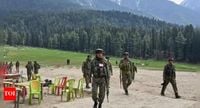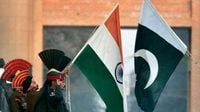On May 8, 2025, tensions between India and Pakistan escalated dramatically as both nations engaged in military strikes following a series of drone attacks and missile launches. The Indian military responded to an attempted strike by Pakistani-origin drones on military installations in Jammu, Pathankot, and Udhampur, neutralizing the threats swiftly without reported casualties. The Defence Ministry confirmed that the Indian armed forces employed both kinetic and non-kinetic capabilities in line with established standard operating procedures.
The Pakistani attacks targeted multiple military sites in Northern and Western India, including key cities such as Awantipura, Srinagar, and Amritsar. According to a Defence Ministry spokesperson, "Military stations at Jammu, Pathankot, and Udhampur were targeted by Pakistani-origin drones and missiles along the International Border in Jammu and Kashmir today." Thankfully, the advanced S-400 missile defense system, procured from Russia, played a pivotal role in intercepting these threats.
Air Marshal Kapoor elaborated on the effectiveness of the S-400, stating, "Pakistan tried to attack 15 of our cities saved by S-400, which was purchased in 2018 and delivered in 2021. It can detect aircraft, missiles, drones, and is fully deployable within minutes and has a range of 400 Kms." The S-400 system's capabilities include tracking multiple targets simultaneously and engaging a range of threats, making it a crucial asset in India's defense strategy.
In retaliation for the Pakistani strikes, the Indian armed forces launched Operation Sindoor on May 7, targeting nine terror sites across Pakistan and Pakistan-occupied Kashmir (PoK). This operation was initiated in response to an earlier terror attack in Pahalgam that resulted in the deaths of 26 individuals, including 25 Indian nationals and one Nepali citizen. The operation was described as "focused and non-escalatory," with the intention of holding those responsible accountable without escalating the conflict further.
Pakistan's Prime Minister Shehbaz Sharif condemned India's actions, asserting that Pakistan reserves the right to respond firmly to what he termed an act of war. He remarked, "The Pakistani nation and the Pakistan Armed Forces know very well how to deal with the enemy. We will never let the enemy succeed in its nefarious objectives." This statement reflects the high tensions and nationalistic sentiments prevalent in Pakistan following the strikes.
As the situation unfolded, panic spread across various cities in both countries due to misinformation regarding ongoing military actions. Unverified videos circulated on social media, claiming fresh strikes were occurring, which heightened public anxiety. In Amritsar, residents reported hearing loud noises, mistakenly attributing them to military action rather than a civil defense drill that had been ordered by the Ministry of Home Affairs.
The Indian Army confirmed that its response to the Pakistani attacks was proportionate, stating, "Our operations have been deliberate, restrained, and non-escalatory. No Pakistani military installations were struck." This careful approach aims to mitigate civilian casualties while still addressing the threats posed by militant groups.
In the wake of these military actions, significant logistical challenges arose, particularly impacting the Indian Premier League (IPL). The Punjab Kings were scheduled to host the Mumbai Indians in Dharamsala on May 11, but with multiple airports in North India shuttered, the match faced uncertainty. BCCI sources indicated that the game might be relocated to Mumbai if the airport closures persisted.
As of now, at least 18 airports across northern and western India have been temporarily shut down, including Srinagar, Jammu, and Amritsar. The Punjab Kings vs. Delhi Capitals match on May 8 was confirmed to proceed, as both teams had already arrived in Dharamsala. However, the situation remains fluid, with logistics for upcoming matches being closely monitored.
In response to the heightened security situation, the Bureau of Civil Aviation Security (BCAS) has mandated increased security measures at airports nationwide. Passengers will undergo additional checks, and visitor access to terminal buildings has been restricted.
The S-400 system's deployment during these recent hostilities marks a significant moment in India's military readiness and capability. The system, which can engage a variety of aerial threats, has been touted as a game changer in India's defense arsenal. With its ability to activate within minutes and cover extensive ranges, it underscores India's commitment to safeguarding its airspace.
As both nations remain on high alert, the potential for further escalation looms large. The Indian government has reiterated its resolve to respond decisively to any threats against its sovereignty, while Pakistan has vowed to protect its interests vigorously. The situation is being closely monitored by international observers, as the implications of this conflict extend beyond the immediate region.
In the meantime, the Indian public is advised to remain calm and avoid spreading unverified information that could exacerbate tensions. As the military and government officials navigate this precarious landscape, the hope remains for a de-escalation of hostilities and a return to diplomatic engagement.
For now, the skies may be quiet, but the ground reality signals a deeper rift that could reshape regional defense postures in the days ahead.



